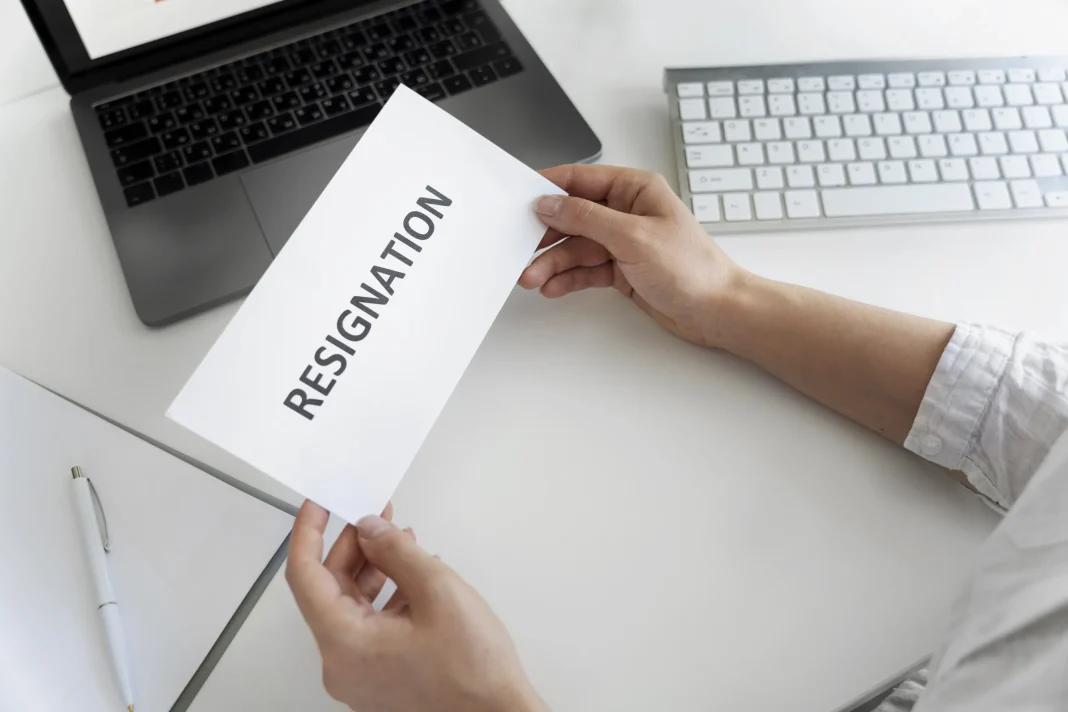It’s time to move on in your career. You’ve decided to quit your job and want to make sure you leave on good terms. One of the things to consider is your resignation letter—should you even write one? When should you send it? And how do you write an effective one?
Writing a resignation letter is about tying up loose ends with a positive twist. It’s your chance to say, “Hey, I’m moving on, but here’s how I can help before I go.” This letter isn’t just a formality; it’s a thoughtful way to wrap up your time at the company, express your gratitude for the experiences, and maintain those valuable professional connections. We’ll walk through how to craft a friendly letter of resignation, discuss ways to transition your duties smoothly, and even share some examples to make it as easy as possible.
Erica Alioto, the global head of people at Grammarly, emphasizes the importance of submitting a formal resignation letter. This holds true even after having an in-person meeting or a phone conversation about resigning.
What to include in your resignation letter
To make it easy for you we made a checklist of key elements to include:
- Title and salutation: Start with a professional title such as “Resignation Letter” and a formal salutation including the appropriate manager or HR department.
- Statement of resignation: Clearly state your intent to leave. Use phrases like “I am writing to inform you of my decision to resign from my position,” specifying your job title and the company name.
- Notice period: It’s standard to give at least two weeks’ notice, so mention your last working day. For example, “Please accept this letter as formal notification of my resignation, effective two weeks from today.”
- Reason for moving on (optional): Briefly mention why you are leaving, if appropriate, but keep it positive or neutral.
- Expression of gratitude: Thank your employer for the opportunities provided during your time at the company. Be thankful for the experiences gained, emphasizing the positive.
- Offer to help with transitioning: Offer assistance during the notice period to train others or hand over your responsibilities. Phrases like “I am committed to ensuring a smooth transition” or “Please let me know how I can assist during this transition” are helpful.
- Closing and signature: Close with a professional ending, like “Sincerely,” followed by your signature and printed name.
Keep your letter professional and to the point to maintain a good relationship with your employer, which can be beneficial for future references and opportunities. This format allows you to step down gracefully while providing all the necessary information succinctly.

When to send a resignation letter?
The best time to submit your resignation letter is immediately after you have discussed your decision to leave with your manager. This approach ensures that your resignation is handled professionally and that your manager hears about your departure directly from you before the formal notice is on record. This sequence helps maintain trust and respect in the transition process.
Resignation Letter Templates
Crafting the best resignation letter requires alignment with your reason for resigning, whether it’s outgrowing the role, a misfit, or a career change. It’s essential that your letter reflects your circumstances clearly and professionally. Always start by formally notifying your employer with a simple resignation letter, providing two weeks’ heads-up to ensure a clear transition. Be grateful for the opportunities you’ve had, and thank your employer for the chance to work and grow.
Offer help during the transition duration, aiming to leave your job on good terms. This approach not only shows respect but also helps maintain a positive relationship, which can be beneficial for future references and opportunities. Remember, the goal is to write a professional letter that reflects your time with the company well and supports your career progression.
Resignation letter examples
When writing your resignation letter, aligning it with your reason for leaving not only provides context but also adds a personal touch. Begin by clearly stating your decision to resign and expressing appreciation for the opportunities provided during your time. Mention your job title and the formal resignation from your position, including this letter as formal notification to the HR department. Your notice period should ideally be at least two weeks, giving ample time for your employer to manage the transition.
Always express your gratitude, commit to helping ensure an easy transition, and wish the company continued success. This approach will help you write a professional resignation letter that respects your experiences and supports future professional relationships.
Resigning to pursue growth opportunities
Dear John,
I am writing to formally announce my resignation from my position as Lead Software Developer at Innovatech Solutions, effective three weeks from today, [Your Last Working Day].
This decision marks a significant turn in my career path, as I’ve chosen to pursue a new direction that aligns more closely with my long-term professional goals. Working with such a talented team has been profoundly enriching, and I am deeply grateful for the skills and insights I’ve gained. As I transition, I am committed to ensuring a smooth handover of my responsibilities.
Thank you for the support, guidance, and opportunities provided to me during my time at Innovatech Solutions. The experiences I’ve had here have been invaluable, and I hope to maintain our professional connection moving forward.
Please let me know how I can assist during this transition period. I appreciate the opportunity to have been part of this team and wish Innovatech Solutions continued success.
Sincerely,
[Your Signature (if sending a hard copy)]
James Doe
Resigning due to a career change
Dear John,
I am writing to formally announce my resignation from my position as Lead Software Developer at Innovatech Solutions, effective three weeks from today, [Your Last Working Day].
This decision marks a significant turn in my career path, as I’ve chosen to pursue a new direction that aligns more closely with my long-term professional goals. Working with such a talented team has been profoundly enriching, and I am deeply grateful for the skills and insights I’ve gained. As I transition, I am committed to ensuring a smooth handover of my responsibilities.
Thank you for the support, guidance, and opportunities provided to me during my time at Innovatech Solutions. I’ve greatly enjoyed and appreciated the opportunities I’ve had to grow our technology team and work on exciting projects that challenge industry standards. I look forward to staying in touch, and I hope to cross paths again in the future.
Please let me know how I can help during this transition.
Sincerely,
[Your Signature (if sending a hard copy)]
James Doe
Resigning after outgrowing the role
Dear [Recipient’s Name],
I am writing to formally announce my resignation from my position as Lead Software Developer at Innovatech Solutions, effective two weeks from today, [Your Last Working Day].
This decision was not made lightly, and it comes after careful consideration of my career path and personal goals. My time at Innovatech Solutions has been a significant part of my professional journey, and I am incredibly grateful for the opportunities to develop and contribute to a talented team.
I am committed to effectively handing over my responsibilities to help ensure a smooth transition. I am happy to assist in training my replacement and will ensure that all my projects are in order before my departure.
Thank you for your support, guidance, and opportunities provided to me during my time at Innovatech Solutions. I’ve greatly enjoyed and appreciated the opportunities I’ve had to grow our technology team and work on exciting projects that challenge the industry standards. I look forward to staying in touch, and I hope to cross paths again in the future.
Please let me know how I can help during this transition.
Sincerely,
[Your Signature (if sending a hard copy)]
James Doe
The importance of expressing gratitude
Expressing gratitude in your resignation letter is crucial for maintaining work relationships and leaving on good terms. This acknowledgment serves as a formal notice of your intention to move on and helps to preserve personal and professional connections. In your letter, sincerely thank your employer and colleagues for their support and the opportunities provided during your tenure. State your commitment to ensuring a smooth transition and offer to assist during this transition period, showing that you are giving two weeks’ notice or more, as is professionally customary. Gracefully including these sentiments not only reflects well on you but also assists in keeping doors open for future engagements.
Why offer to help with the transition?
Offering to help with the transition in your resignation letter shows professionalism and goodwill. It helps maintain a positive relationship with your former employer and colleagues, ensuring a smoother handover of your responsibilities. This gesture can lead to positive references and keep doors open for future opportunities. It demonstrates your commitment to the organization’s continued success, even as you prepare to leave.
What not to include in a resignation letter?
When drafting a resignation letter, keep it professional and to the point. Here are some key things to avoid including:
- Negative Feedback: No matter the reason, avoid criticism or complaints about the company or colleagues.
- Excessive Details: Do not need to go into great detail about why you are leaving or what your new opportunities entail.
- Personal Information: Avoid sharing overly personal information about your reasons for leaving.
- Blame: Refrain from blaming others for your decision to resign.
- Confidential Information: Do not share any sensitive or confidential information about the company or its practices.
- Demands or Conditions: Avoid making any demands or setting conditions for your departure.
Remember to give notice respectfully, ideally giving two weeks, and clearly state your intention to resign. Send your resignation in an electronic copy if necessary, keeping your tone appreciative of the experiences you have gained.
Final Steps: Personalizing your resignation letter
With all the tools provided—from templates to key concepts—you’re equipped to craft your resignation letter. Simply select the template that fits your needs and personalize it to reflect your circumstances, ensuring a professional and considerate departure.
Good luck!


